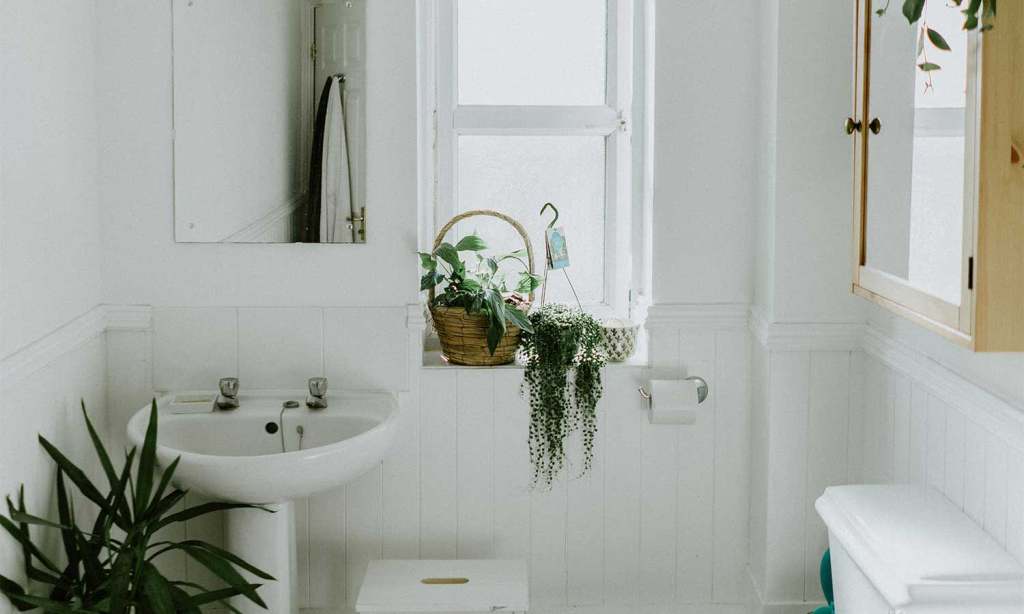On average, humans spend an average of 855 days of their lives in the bathroom — to go to the loo, do their makeup, shower, and sometimes, relaxation. But it’s yet another room of our home that can quickly accumulate a lot of waste.
We’ve investigated whether there’s a way to reduce this, and ahead, we’re sharing five ways you can re-stock your bathroom with more eco-friendly options that will help you extend the lifespan of your products to save you, as well as our planet’s precious resources.
Refillable Products
The countertop of your sink is likely to be lined with plastic bottles of shampoo, conditioner, cleansers and cosmetics. Instead of ditching these bottles after each use, consider opting for refillable products that can be refilled at wholesale stores (many bulk-buy dried goods stores have a section at the counter for this). This way you can extend the lifespan of the same bottle for a long time.
Alternatively, if you are ready to try something new and go completely plastic-free, you could opt for shampoo and soap bars. These bars are made from a mix of oils from plants or lard from animals, lye (also called sodium hydroxide), and sometimes a fragrance. These soap and shampoo bars can be used for between 30 and 140 washes, and need to be kept in a cool, dry, well-ventilated place, away from water sources and direct sunlight.
For make-up removers, consider investing in a set of bamboo cloth pads that can be rewashed and reused, instead of one-time facial tissues that are often made from cotton (a water-intensive crop).
All-in-One, Multi-Use Cleaners
Have you stopped at the cleaning aisle at the supermarket and wondered why there are so many different products needed to clean the various nooks and crannies of your bathroom, often with very little difference in their descriptions?
Instead, try to favour multi-purpose cleaners sold as concentrates that can be diluted for use in different parts of the house. These products will have the added benefit of providing a more powerful and long-lasting product to your cleaning arsenal, without you having to buy replacements every month.
Better Paper
How many different tissues do you have stocked in your bathroom? Three? Chances are you have facial tissues, paper towels and toilet paper stacked in your bathroom for various uses. Theoretically, the varying quality and texture of these products have presented them for different uses — and high amounts of waste.
Skip out on paper completely and opt for reusable towels for hand-wiping. As for toilet paper, give recycled toilet paper, or toilet paper made from fast-growing bamboo trees, a try. If you’re up for a switch up in your lifestyle, you could also install a bidet to your toilet bowl which will leave your tush feeling fresh each time you click on their spray systems.
Monthly Essentials
For every person who menstruates, this one is for you. Instead of single-use tampons and sanitary pads, perhaps you could consider the menstrual cup or period panties.
These might sound completely alien to anyone who has been using pads for their entire adult lives. We feel you. But, period cups have been researched and made from silicon that is clean, safe and long-lasting, which means, you could save hundreds of dollars if you re-use your cup for the next decade.
Additionally, period cups save you from going to the toilet as often and disposing of seemingly 432 million pads every month. There is a brief adjustment period, but once you’re used to using a cup, there’s no going back.
If you are uncomfortable with using a period cup, you could start off with washable period products and then slowly work your way to period cups.
Shave In Peace
Cheap, disposable razors often do a shoddy job of ridding yourself of hair and also result in cuts and in-grown hairs that are begging us to stop using them.
The alternative to plastic razors is long-lasting, durable metal safety razors that can be used by any gender for a close shave and a smoother result. The razor portion should be washed and kept dry after each use and stored in any area away from sunlight and water.
Read more stories from The Latch and subscribe to our email newsletter.

